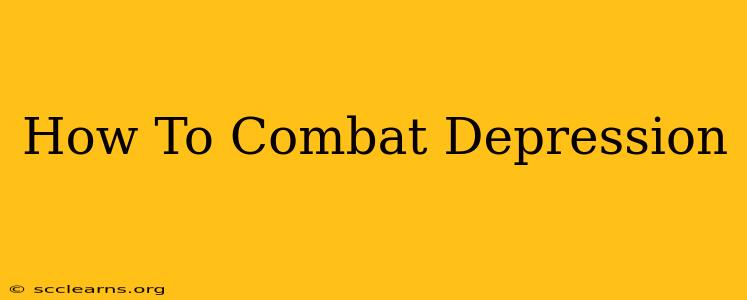Depression is a serious mental health condition affecting millions worldwide. It's not simply feeling sad; it's a persistent state of low mood that significantly impacts daily life. However, it's crucial to remember that depression is treatable, and with the right approach, you can find hope and healing. This guide provides practical strategies to combat depression and reclaim your well-being.
Understanding the Depths of Depression
Before diving into solutions, it's vital to understand what depression entails. It's characterized by a range of symptoms, including:
- Persistent sadness or low mood: This isn't just a passing feeling; it's a pervasive state that lingers for extended periods.
- Loss of interest or pleasure: Activities once enjoyed now feel burdensome or unappealing. This is known as anhedonia.
- Changes in appetite or weight: Significant weight loss or gain, often without intentional dieting or overeating.
- Sleep disturbances: Insomnia (difficulty sleeping) or hypersomnia (excessive sleeping).
- Fatigue or loss of energy: Feeling constantly tired and lacking motivation.
- Restlessness or irritability: Feeling agitated, easily frustrated, or on edge.
- Feelings of worthlessness or excessive guilt: Negative self-perception and overwhelming feelings of shame.
- Difficulty concentrating, remembering, or making decisions: Cognitive impairment affecting daily functioning.
- Recurrent thoughts of death or suicide: In severe cases, suicidal ideation can be a significant concern.
If you're experiencing several of these symptoms for a prolonged period, it's crucial to seek professional help. Don't suffer in silence.
Effective Strategies to Combat Depression
Combating depression requires a multifaceted approach, combining professional guidance with self-help strategies.
1. Seek Professional Help: The Cornerstone of Recovery
This is arguably the most important step. A mental health professional, such as a psychiatrist, psychologist, or therapist, can accurately diagnose your condition and develop a personalized treatment plan. Therapy, particularly cognitive behavioral therapy (CBT) and interpersonal therapy (IPT), has proven highly effective in managing depression. Medication, such as antidepressants, may also be necessary in some cases. Don't hesitate to reach out – it's a sign of strength, not weakness.
2. Lifestyle Adjustments: Nurturing Your Well-being
Making positive changes to your lifestyle can significantly impact your mood and overall well-being.
- Regular Exercise: Physical activity releases endorphins, natural mood boosters. Aim for at least 30 minutes of moderate-intensity exercise most days of the week.
- Healthy Diet: Nourishing your body with a balanced diet provides the essential nutrients needed for optimal brain function. Limit processed foods, sugar, and caffeine.
- Sufficient Sleep: Aim for 7-9 hours of quality sleep each night. Establish a regular sleep schedule and create a relaxing bedtime routine.
- Mindfulness and Meditation: Practicing mindfulness techniques can help you become more aware of your thoughts and feelings, reducing rumination and anxiety.
- Social Connection: Maintaining strong social connections is vital for mental well-being. Spend time with loved ones, participate in social activities, or join support groups.
3. Cognitive Restructuring: Challenging Negative Thoughts
Depression often involves negative and distorted thinking patterns. Cognitive restructuring techniques, often taught in CBT, help you identify and challenge these negative thoughts, replacing them with more realistic and positive ones. This can significantly improve your mood and outlook.
4. Self-Compassion: Treating Yourself with Kindness
Be kind to yourself. Depression is a challenging condition, and it's essential to approach your recovery with compassion and understanding. Avoid self-criticism and focus on self-acceptance.
5. Seeking Support: Building Your Support Network
Don't be afraid to reach out to friends, family, or support groups. Sharing your struggles can alleviate feelings of isolation and provide valuable emotional support.
When to Seek Immediate Help
If you are experiencing suicidal thoughts or feelings, seek immediate help. Contact a crisis hotline, mental health professional, or emergency services. Your life is valuable, and help is available.
Remember: Recovery from depression is a journey, not a destination. There will be good days and bad days. Be patient with yourself, celebrate your progress, and never give up hope. With the right support and strategies, you can overcome depression and lead a fulfilling life.

